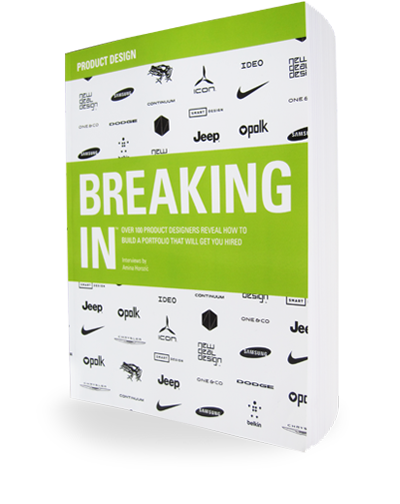Check out some great work from Ralph Gilles.
Interviewed while Ralph was Senior Vice-President of Product Design and President and CEO of SRT Brand and Motorsports at Chrysler in Auburn Hills, Michigan.
I’m sure when it comes to portfolios, you’ve seen it all. What gets your attention these days? What brings in an industrial designer for an interview?
A nice range of very, very forward-thinking ideas. I’m excited when people take risks with design. At the same time, I like a few bookends. I like to see that the person can do more immediate stuff because sometimes we have immediate projects. We can see if the person can latch onto those. I’d like to see a couple of different themes. What I mean by that is when someone does a very loose sketch and they’re able to translate that into a design, without losing the essence of the sketch, you can see the theme survives the process of maturity and evolution. I also like designers that include their inspiration. What’s their philosophy? Some kind of a philosophical base in their work is very important to me.
Is there an example of a recent portfolio that you’ve seen that blew you away? Have you seen a portfolio recently and thought, “Wow this is awesome”?
Generally, I think the quality of portfolios has come up dramatically. I think a lot of it has to do with the computing power available to students nowadays. Some of them have personal computers that are more powerful than our professional stuff was five years ago. It has definitely opened up the quality of work, the rendering quality, even the presentation, so I’m a little bit distracted by the vis com [visual communications]. Some of these kids are publishing books or quarter-of-an-inch thick magazines of their work. How did you afford that? The tools that they have make the work appear of higher quality, so it’s actually harder for me now because I have to look through all of that and see the pure designer.
[ … ]
What do you expect to learn from a designer during an interview?
In all cases, and this is personally my point of view not a general design-head point of view, my first impression is always the ego. Does this person come in with some kind of outside ego or not? That’s the thing we hate the most at Chrysler. We’re very much about sharing. We all share. We are willing to adapt and learn from each other, so the ego is the first thing I deal with. If they say “I” a lot in their interview, or talk all about them becoming the world’s best designer in five years, and not about contributing to the company, they’re out. The humility is very important to me and the willingness to be a team player.
What characteristics or qualities would you say make a successful designer?
I think the ability to spin a design in your head. The ability to draw a singular theme in all views—the command of form. You can tell if someone sketches the same idea, but it’s really different in every view, it means they’re not quite able to design it in their minds. That’s something I notice right away. That technical skill where you’re almost able to create a mental 3D property, where you’re basically illustrating it in various views…that’s a very powerful skill.
[ … ]
You’re one of the rare industrial designers with an MBA. I’m wondering if you can share some insights from that experience. How have the skills from that helped you as a designer? Did it add to your success, and would you recommend it?
Absolutely. I don’t think it’s necessary in the first stage, for sure. It’s not going to make a difference whether you get hired or not—especially at the beginning. But once you’re inside a company I highly recommend it. The automotive business is a very complicated business. I think the MBA really helped me to integrate myself with the rest of the community because finance people, most of the engineering people, and all of the marketing people have an MBA. You’re swimming in a pretty elite field, so it’s really important and nowadays it’s almost a requirement in business if you want to go further. So I highly, highly recommend it.
[ … ]
Knowing what you know now, what advice would you give to your younger self?
Get mentorship. I think it’s important to really seek out information. We tend to work a little bit too quick, too fast, and regurgitate things. You have to reset yourself every couple of years and see outside of your profession for inspiration, or encourage your people to do that. Be as fresh as possible. Be hyper-aware of the design world, not just automotive, but anything going on in design. There’s inspiration in every corner of life.
[ … ]

Ralph Gilles of Fiat Chrysler Automobiles N.V.

Comments are closed.